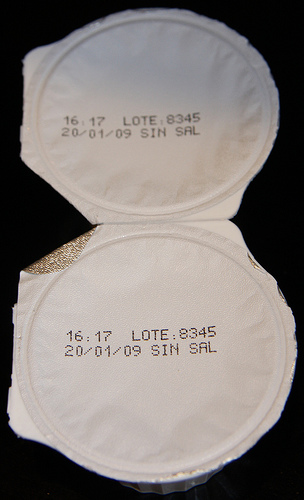
At a store today I saw two containers of Siggis “Icelandic style” yogurt I wanted. One said “best by 4/27/09″; the other said “best by 5/18/09″. To my shock I realized the older one was better. It had more bacteria.
The opposite of what we’re supposed to think.
Expired food — don’t throw it out, give it to me.
Wouldn’t you also get similar ‘living food’ effects by just leaving your food out unrefrigerated for a while before consumption?
For times when you can’t get to a whole foods like on business trips, it might be a good way to get your bacteria…buy the food that ‘drips’ the most (cheeseburger, soup, cole slaw etc.) and leave it out.
By “better” do you mean tastier, more wholesome and things along those lines?
I’m enjoying my first ever home made (from paste, not packet) bowl of miso soup – I can just feel those bacteria multiplying!
I thought you were making your own yogurt – as I plan to do. What does this store bought yogurt offer that home made does not?
On a related note, you’ve given us so many recommendations over the months … do you maintain a central list of preferred fermented foodstuffs and brands? Thanks.
Ashish, you’re right, homemade is much better. I’m away from home, that’s why I’m eating store-bought yogurt. This particular brand is unusually strong.
Confidence, by “better” I mean healthier. I eat yogurt for the bacteria — the more bacteria the better.
Chris, yes, I believe I can improve food by leaving it unrefrigerated, and I’ve been doing that.
Is variety of bacteria an important part of your hypothesis?
I ask because, the process of pickling, which is an anaerobic fermentation process as well, is done specifically to preserve food by making the food hostile to (other) forms of bacteria. Thus the food after pickling, contains fewer variety of bacteria than before, but a higher volume of the fermenting bacteria (I’m guessing).
I’m not yet sure if even the fermenting bacteria is left behind after pickling. I can think of fermentation/pickling as a self-limiting process that stops when the acids produced kill of most of the fermenting bacteria themselves (this is similar to what Patrick says).
But that’s a different matter; for now I’m interested in your thoughts on variety vs. volume.
“Is variety of bacteria important?” I don’t know. I’m sure quantity matters.
“Is variety of bacteria important?” I don’t know. I’m sure quantity matters.
@seth
How is that you don’t know if variety is important, but are sure that quantity matters?